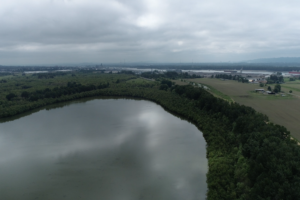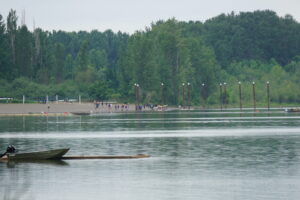Friends of Vancouver Lake says the clock is ticking.
Eurasian milfoil, an aquatic invasive weed, is threatening to choke Vancouver Lake’s shallow waters with a tangle of vegetation and render the lake unusable for rowing, sailing and other recreation.
“This Eurasian milfoil just grows like wildfire,” Friends member Larry Cassidy told The Columbian’s Editorial Board this week. “If we don’t do something, it will take over the lake by 2022.”
How milfoil got into Vancouver Lake isn’t known. Cassidy, who lives in the Lake Shore area and has spent decades working on fish, wildlife and power issues, speculated that it was introduced by a boat. It also could have entered through the flushing channel connecting the lake to the Columbia River, where there is milfoil, he said.
Regardless, Friends of Vancouver Lake says the milfoil infestation tripled in size last year.
“If it’s not dealt with this year, it’s going to be twice as expensive next year,” said Jim Luce, another member of the group.
Friends of Vancouver Lake is trying to raise about $175,000 so a portion of the lake can be treated this year with ProcellaCOR, an herbicide the U.S. Environmental Protection Agency approved in February 2018.
The group says it already has raised $72,000, with the bulk of its money coming from a $45,000 contribution from the Firstenburg Foundation. Friends of Vancouver Lake also has two $25,000 conditional donations from local corporations, which it has declined to identify. Both donations will be lost if matching dollars aren’t secured by the end of May.
Port contribution sought
This week, group members appealed to Port of Vancouver commissioners to provide $50,000 so 400 to 500 acres of the lake could be treated this year.
Ted Gathe, a former Vancouver city attorney and Friends of Vancouver Lake member, told port commissioners the herbicide dissipates quickly so people could resume using the lake within 24 to 48 hours after application.
“We are certain it will be quite effective,” he said.
Cassidy said the group needs partners in local governments to financially assist in eradicating milfoil, both for this year and for maintenance treatments in future years, as well as for managing Vancouver Lake on an ongoing basis.
“It’s not reasonable, under any circumstances, to expect private money to solve this problem,” he told port commissioners.
Commissioners seemed sympathetic to the group’s request. Commissioner Eric LaBrant made a motion to direct port CEO Julianna Marler to proceed with the $50,000 contribution, but the commissioners decided not to take action this week and will discuss the request further at their May 28 meeting.
“I appreciate your efforts to address this,” Commissioner Don Orange said. “Admittedly, Vancouver Lake has a hell of a problem, and hopefully, a hell of a potential for our community.”
Ecology permit
Friends of Vancouver Lake already has been in contact with AquaTechnex, a company that specializes in aquatic plant and toxic algae management, phosphorus pollution removal and invasive species control, to treat Vancouver Lake for milfoil.
Earlier this month, the state Department of Ecology issued a permit to AquaTechnex to address the milfoil issue. Colleen Keltz, communications manager in the ecology department’s water quality program, said her agency has yet to authorize the use of ProcellaCOR.
“We have committed to making our decision on ProcellaCOR by June 5,” she said. “If it is approved, it would be allowed to be used by July 5.”
Gathe said he expects the chemical will be approved for use in July.
The department of ecology also has provided a grant to the state Department of Fish and Wildlife to develop an aquatic vegetation management plan for Vancouver Lake. It will provide $30,000, with Fish and Wildlife contributing $10,000. Clark County will take the lead in preparing the plan.
Vancouver Lake has a long history of water-quality woes, including cyanobacteria, also called blue-green algae, that routinely closes the lake to swimming. Addressing these issues is complicated by uncertainty over who is ultimately responsible for the lake.
“No one owns up to ownership of Vancouver Lake,” Luce said.
If milfoil makes Vancouver Lake unusable, the community could take an economic hit from the loss of regattas and other events that bring visitors to the community.
Starting today, the lake will host the three-day 2019 USRowing Northwest Youth Championships. This will be the eighth year Vancouver Lake has hosted the event. More than 1,500 athletes competed last year.




